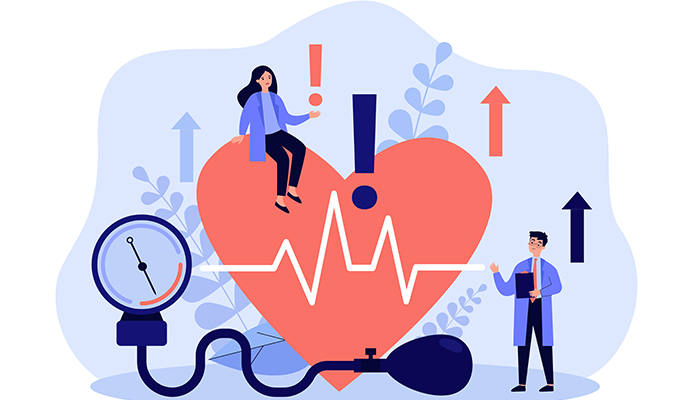Steps to enhance your wellness through Cardiology care
Steps to enhance your wellness through Cardiology care
Blog Article
Recognizing the Significance of Cardiology in Modern Healthcare Solutions
Cardiology plays an essential function in modern-day healthcare, especially as heart disease remains to be the leading reason of mortality worldwide. Developments in diagnostics and therapy have changed person care, enabling earlier interventions and boosted end results. Additionally, the shift towards precautionary cardiology equips individuals to handle their health and wellness proactively. As modern technology continues to evolve, the assimilation of ingenious solutions might better redefine cardiology's influence on public health and wellness, prompting a closer exam of arising patterns and their ramifications.
The Prevalence of Heart Disease and Its Influence On Public Health And Wellness
Heart condition stays the leading cause of fatality worldwide, its influence prolongs far past private people to impact public wellness systems and economic climates. The high prevalence of cardiovascular disease positions a substantial stress on medical care resources, necessitating raised funding for therapy, rehabilitation, and prevention programs. Public health and wellness campaigns should resolve danger elements such as weight problems, smoking, and less active way of lives, which add greatly to the increasing occurrence of heart conditions.Moreover, the economic concern linked with heart illness is enormous, incorporating not only direct clinical prices but also indirect costs associated with shed productivity and premature death. Areas face difficulties in taking care of these prices, typically resulting in variations in medical care accessibility and outcomes. As the population ages and lifestyle-related dangers remain to intensify, the seriousness for efficient cardiology treatments comes to be paramount. Addressing heart condition is not just a matter of private health and wellness but additionally an essential public wellness concern.
Advancements in Heart Diagnostics and Imaging Techniques
Current improvements in cardiac diagnostics and imaging techniques have revolutionized the field of cardiology, improving the capability to find and keep an eye on cardiovascular disease. Techniques such as heart MRI, CT angiography, and echocardiography have actually come to be progressively advanced, providing thorough pictures of cardiac structures and features. These techniques permit the very early recognition of conditions like coronary artery condition, cardiac arrest, and valvular disorders.Moreover, developments in non-invasive diagnostics, such as wearable technology and remote surveillance gadgets, have encouraged clients and doctor. These tools facilitate real-time monitoring of heart rhythms and various other essential indications, leading to prompt interventions. In addition, expert system is being integrated right into imaging analysis, boosting accuracy and performance in diagnosis.
Technologies in Treatment Alternatives for Heart Conditions
Recent innovations in cardiology have brought about significant advancements in treatment choices for heart disease. These consist of sophisticated medical techniques that improve step-by-step outcomes and arising drugs that use new opportunities for treatment. As the area advances, these developments play a crucial duty in boosting client care and results.
Advanced Surgical Techniques
Technologies in medical techniques have transformed the landscape of cardiology, using new expect individuals with heart conditions. Minimally invasive procedures, such as catheter-based treatments, have considerably decreased recovery times and healthcare facility keeps. Techniques like robotic-assisted surgical treatment improve precision, allowing surgeons to navigate complicated anatomical structures with higher accuracy. Moreover, improvements in imaging modern technology help with real-time visualization during procedures, improving outcomes. Transcatheter aortic valve replacement (TAVR) exemplifies an advancement in treating aortic stenosis, making it possible for shutoff substitute without open-heart surgical procedure. Furthermore, hybrid techniques that integrate surgical and catheter-based techniques offer tailored solutions for numerous heart problems. These sophisticated surgical strategies not only enhance person safety and security however additionally broaden treatment choices, highlighting the essential duty of advancement in contemporary cardiology practices.
Arising Medications and Treatments
As the landscape of cardiology proceeds to develop, emerging treatments and medications play a pivotal role in improving treatment alternatives for heart disease. Innovations such as novel anticoagulants and progressed lipid-lowering agents have changed the management of cardio diseases, substantially decreasing person morbidity and death. Additionally, the growth of genetics therapies and regenerative medication supplies encouraging opportunities for dealing with conditions formerly deemed incurable. Medical tests are constantly disclosing the efficacy of these treatments, pressing the boundaries of typical treatments. The combination of electronic health technologies assists in tailored medicine, enabling for customized therapy strategies based on genetic and lifestyle factors. Collectively, these developments highlight the vibrant nature of cardiology, improving client results and redefining standards of care in modern healthcare.
The Role of Preventive Cardiology in Client Care
Preventive cardiology plays a vital role in patient care by focusing on the identification of danger elements that contribute to heart problem. With way of life modification techniques and early detection techniques, doctor can successfully minimize the incidence of cardiovascular events - Cardiology. This aggressive technique not only enhances client outcomes but additionally advertises long-lasting health and wellness
Risk Factor Identification
While heart diseases stay a leading reason for morbidity and death worldwide, reliable danger element identification functions as a foundation of precautionary cardiology. Identifying threat factors such as high blood pressure, family members, diabetes, and hyperlipidemia background is essential for very early treatment. Healthcare specialists use numerous evaluating methods to examine these elements, permitting tailored preventive procedures. Additionally, recognizing a client's way of living choices, such as smoking cigarettes and physical inactivity, additionally informs danger assessments. This complete evaluation allows medical professionals to establish tailored care strategies intended at mitigating risks. By focusing on threat element recognition, medical care systems can enhance individual outcomes and decrease the general worry of heart diseases, inevitably contributing to enhanced public health and wellness approaches and resource allowance.
Way Of Living Modification Techniques
A plethora of studies highlights the vital function of way of living adjustment methods in lowering heart disease risk. These techniques include nutritional adjustments, raised physical activity, smoking cessation, go to this site and weight management. By embracing a heart-healthy diet plan abundant in fruits, vegetables, whole grains, and lean healthy proteins, people can reduce cholesterol degrees and high blood pressure. Routine exercise strengthens the heart and improves overall cardiovascular health. Additionally, quitting smoking significantly decreases the risk of cardiovascular disease and enhances recovery prices for those with present problems. Weight administration additionally contributes to cardiovascular health by mitigating various other threat aspects such as diabetic issues and hypertension. Implementing these way of living transforms not only promotes individual health however likewise functions as a keystone of precautionary cardiology in client care.
Very Early Detection Methods
Lifestyle alterations considerably contribute to reducing cardio disease dangers, yet they are most efficient when paired with early discovery methods. Precautionary cardiology emphasizes the value of determining potential heart problems before they rise into significant conditions. Techniques such as blood stress monitoring, cholesterol testing, and advanced imaging technologies like echocardiograms play critical functions in evaluating cardiovascular wellness. Biomarkers and genetic screening likewise boost the precision of very early detection, enabling for customized precautionary approaches. Regular heart risk examinations encourage doctor to step in proactively, possibly avoiding cardiovascular disease and strokes (Cardiologist near me). By integrating these very early discovery methods into regular treatment, patients can take advantage of prompt lifestyle interventions and targeted therapies, inevitably enhancing and enhancing results top quality of life
Integrating Technology Into Cardiology Practices
As improvements in modern technology remain to reshape different fields, the combination of cutting-edge tools and systems into cardiology practices has ended up being important for improving patient care and end results. Telemedicine systems allow cardiologists to monitor clients from another location, enhancing accessibility to care while lowering the burden on healthcare centers. Wearable devices, such as smartwatches, enable continuous heart price monitoring, notifying both doctors and individuals to prospective problems in real-time. Furthermore, expert system (AI) is being utilized to evaluate large amounts of heart information, helping in early diagnosis and customized treatment strategies. Advanced imaging strategies, consisting of 3D echocardiography, improve visualization of heart structures, leading to extra specific interventions. Electronic wellness documents (EHRs) improve client information monitoring, making sure that cardiologists have instant access to essential information. Together, these technological innovations are changing cardiology, promoting proactive monitoring and enhanced health results for clients with cardio conditions.
The Value of Patient Education And Learning and Engagement
Individual education and learning and interaction play a pivotal function in the monitoring of cardiovascular wellness. By equipping individuals with knowledge regarding their problems, treatment choices, and way of living adjustments, doctor equip people to take an active function in their treatment. This aggressive approach can cause boosted adherence to prescribed medications, nutritional changes, and exercise programs, eventually lowering the risk of complications.Engagement also fosters a strong patient-provider connection, urging open interaction and trust fund. When patients feel notified and included, they are most likely to voice problems and ask inquiries, which can lead to better medical results. Furthermore, academic resources, such as workshops or digital systems, can improve understanding and advertise self-management approaches. Overall, prioritizing individual education and learning and interaction is necessary for boosting cardio health and wellness, enhancing top quality of life, and minimizing medical care expenses connected with heart diseases.
Future Trends in Cardiology and Their Potential Impact

Often Asked Questions
What Way Of Living Adjustments Can Decrease Heart Problem Risk?
The existing inquiry addresses way of life modifications that can considerably minimize heart illness risk. Cardiology care. Taking on a well balanced diet plan, engaging in normal physical activity, maintaining a healthy and balanced weight, managing anxiety, and staying clear of tobacco can especially enhance cardio health and wellness
How Can I Recognize Very Early Indications of Heart Problems?
Identifying very check this site out early indicators of heart problems entails monitoring signs and symptoms such as chest discomfort, shortness of breath, tiredness, and uneven heartbeat. Prompt awareness of these indications can trigger necessary clinical evaluation and intervention for far better end results.
What Are the Differences In Between Cardiologists and Cardiac Surgeons?
The differences in between cardiologists and cardiac doctors exist in their duties; cardiologists mainly diagnose and handle heart disease through non-invasive techniques, while heart surgeons do medical procedures to fix architectural heart concerns. Each plays an important, distinctive function.

How Often Should I Obtain My Heart Health And Wellness Checked?
The frequency of heart checkup varies based upon private threat variables. Usually, adults should undertake examinations every one to 2 years, while those with present problems may need more frequent assessments as encouraged by healthcare specialists.
What Function Does Genetics Play in Cardiovascular Disease Risk?
Genes significantly influences heart problem risk, with domestic patterns indicating acquired conditions. Certain genes can incline people to high blood pressure, cholesterol problems, and other cardio troubles, highlighting the value of genetic screening in reviewing heart health and wellness. Heart illness remains the leading cause of fatality worldwide, its impact expands far past private people to impact public wellness systems and economic climates. Public health efforts have to deal with danger variables such as weight problems, smoking, and inactive lifestyles, which add significantly to the rising occurrence of heart conditions.Moreover, the economic worry associated with heart illness is enormous, incorporating not only direct clinical prices but likewise indirect costs connected to shed productivity and premature mortality. Precautionary cardiology plays a crucial role in individual treatment by focusing on the identification of threat aspects that add to heart illness. Fabricated intelligence (AI) and device discovering are improving diagnostics and patient tracking, making it possible for very early detection of heart illness. The distinctions in between cardiologists and heart surgeons lie in their roles; cardiologists primarily diagnose and manage heart conditions through non-invasive approaches, while heart doctors execute medical treatments to remedy structural heart problems.
Report this page